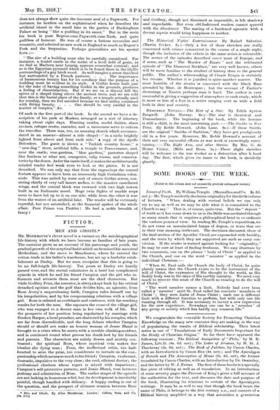SOME BOOKS OF THE WEEK.
{Notice in this column does not necessarily produde subsequent review.]
Issues of Faith. By William Temple. (Macmillan and Co. 2s. 6d. net.)—Mr. Temple modestly disclaims originality for this little volume of lectures. " When dealing with central beliefs we can only try to say as well as we may be able what it is committed to the Church to say." That is, of course, quite true. But the " deposit " of truth as it has come down to us in the Bible was mediated through so many minds that it requires a philosophical head to co-ordinate the various points of view. In reading Mr. Temple's expositions, we do not come on unassimilated lumps of dogma, or texts that are in their true meaning irrelevant. The doctrines discussed, those of the final section of the Apostles' Creed, are expounded with lucidity, and the texts by which they are supported are such as carry con- viction. If the reader is warned against looking for " originality," he may be sure at least of finding freshness. We may illustrate by two comments, one on the phrase " body of Christ " as applied to the Church, and one on the word " member " as applied to the individual Christian :— " When St. Paul calls the Church the body of Christ, he quite plainly means that the Church exists to be the instrument of the will of Christ, the expression of His thought to the world, as His fleshly body was in the days of His earthly ministry. We need very much to recover this sense of the Church as existing to do the will of Christ."
" The word member means a limb. Nobody had ever been called a ' member ' until St. Paul called his converts ' members of Christ' ; they were limbs of Jesus Christ ; each one a different limb with a different function to perfbrrn, but with only one life running through all. It was necessary to invent a new expression for the new experience. Nowadays one can be a ' member' of any group or society which has hardly any common life."


























 Previous page
Previous page